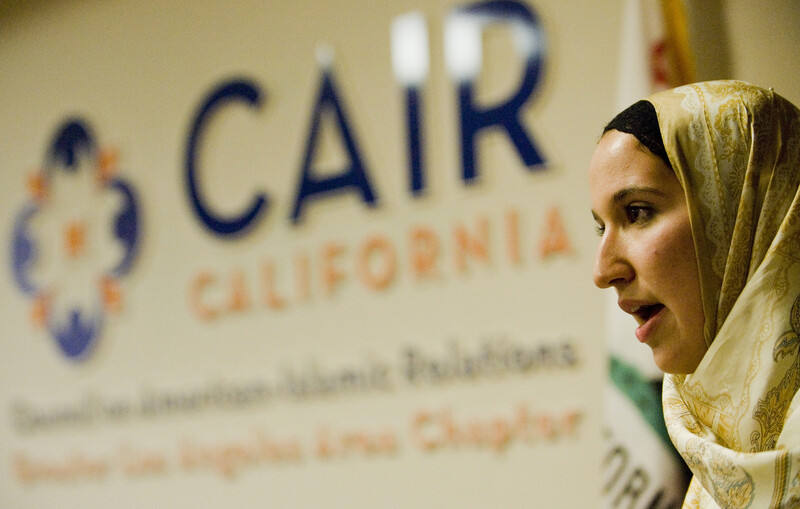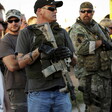The Electronic Intifada San Francisco 22 October 2013

CAIR says that the blacklisting has undermined its work advocating for the rights of US Muslims.
ZUMA PressBased on flimsy evidence, the FBI has sabotaged efforts to be on good terms with Muslim communities in the US by accusing the Council on American-Islamic Relations (CAIR) of being linked to a “terrorist organization.”
Founded in 1994, CAIR monitors policies that affect Muslim Americans and provides legal representation in cases of civil rights violations. The largest nationwide organization advocating for Muslims’ rights in the US, CAIR says the blacklisting has undermined its work at a time when it is needed the most.
The group first became aware of its change of status on 8 October 2008, when James Finch, the special agent in charge of the FBI’s Oklahoma City field office, sent a letter to participants of the state’s Muslim Community Outreach Program. In the letter, he informed them that the upcoming quarterly meeting between members of the Muslim community and local law enforcement would be canceled due to CAIR’s participation.
“It was surprising because up until that point, CAIR in Oklahoma had enjoyed a very good relationship with the FBI,” Adam Soltani told The Electronic Intifada. Soltani is the third and current executive director of the Oklahoma chapter of CAIR.
“They had attended our events, annual banquet, our training functions on ‘know your rights,’” recalled Soltani, who served on the chapter’s board of directors from 2006 until 2008.
That was the first communication that CAIR had received suggesting that the organization’s relationship with the FBI was to about to change. Two weeks later — on 22 October 2008 — the FBI met with the national director of CAIR and informed the organization of the new “parameters for any future interaction” with the FBI: as of that point the FBI would no longer attend CAIR-sponsored events and CAIR would not be invited to attend any FBI-sponsored event.
“Unindicted co-conspirator”
The events that precipitated the blacklisting of CAIR can be traced back to May 2007, when CAIR was listed — along with 246 individuals and organizations — as an “unindicted co-conspirator” in the federal government’s case against the Holy Land Foundation, the largest Islamic charity in the US until it was shut down by a Bush administration executive order in December 2001.
The sprawling list of “unindicted co-conspirators” was divided into 11 categories, identifying those included on the list by their alleged membership in or participation with Hamas or Muslim Brotherhood-affiliated groups. CAIR, for instance, was listed under “members of the US Muslim Brotherhood’s ‘Palestine Committee’ and/or its organizations.”
There is very little precise information available about the Palestine Committee. The Investigative Project on Terrorism, an anti-Muslim website founded by Steven Emerson, describes it as a group formed by leaders of “the Muslim Brotherhood of the Levant.” Corey Saylor, the current communications director of CAIR, knows only that it was “a group that existed in the early 1990s that seemed to have strengthening pro-Palestinian work at its core.”
The Palestine Committee is alleged to have initially spawned four US-based organizations, the Holy Land Foundation being one of them.
The government’s first case against the Holy Land Foundation ended in mistrial. But the foundation was re-prosecuted in 2008, and found guilty by the jury. From 2008 to 2012, the case weaved its way through the courts, stopping short of the Supreme Court. For the first time in the history of the US court system, prosecutors were allowed to admit anonymous expert testimony — by an Israeli intelligence agent — significantly limiting the defense’s ability to cross-examine.
Tenuous
The evidence the FBI used to implicate CAIR as a “co-conspirator” with the Holy Land Foundation is tenuous.
It includes the claims that CAIR received money from the foundation in 1994 — before it was designated a “terrorist organization” — and that Omar Ahmad, the former chairperson of CAIR, and Nihad Awad, the founder of CAIR, were present at an October 1993 meeting of the Palestine Committee in Philadelphia.
Participants in this two-day meeting allegedly expressed support for “the Movement,” which the FBI interpreted as Hamas, and opposition to the Oslo agreement between Israel and the Palestine Liberation Organization that had been formally signed only the month before.
Court transcripts and documents in the FBI’s case available on Emerson’s Investigative Project on Terrorism site show that the meeting was bugged by the FBI (“Testimony of FBI Agent Lara Burns [and others], 9/29/2008,” p. 123-4 [PDF]).
In 1994 Hamas had not yet been criminalized in the US. Hamas was placed on the list of terrorist organizations in 1995, when President Bill Clinton signed an executive order designating Palestinian groups that rejected the Oslo accords as “terrorist organizations which threaten to disrupt the Middle East peace process.”
Prior to this policy, the US government had maintained tepid diplomatic relations with Hamas. But in the early 1990s, Israel began making the case that Hamas was as much a threat to US national security as it was to Israel’s.
In a 2008 article published by the Journal of Palestine Studies, lawyers Michael E. Deutsch and Erica Thompson document how the Israeli government, in the early 1990s, built its campaign to accuse Palestinian American Muhammad Salah as a terrorist and Hamas leader by arguing that Hamas had established its leadership in the US.
As Deutsch and Thomas write: “The [Government of Israel] press office released a diagram of Hamas’ operational structure, reproduced in a number of publications, which put ‘US leadership’ at the top and drew lines that extended to several Middle Eastern states, including Iran” (“Secrets and Lies: The Persecution of Muhammad Salah”).
This doctrine — that the US must abort the germinating “nerve center” of Hamas operatives in the US — was eventually codified in Clinton’s 1995 executive order and exemplified in the government’s case against the Holy Land Foundation, which would not reach the courts until May 2007. Salah was put on a list of “designated terrorists” following a decision by the Clinton administration, and though a federal court acquitted Salah of all terrorism charges in 2007, he was not removed from the list until 2012 after a legal challenge.
At that point, the government filed its first brief charging the Holy Land Foundation with conspiracy to provide support to Hamas, now a designated terrorist organization. After nearly 13 years of investigating the Holy Land Foundation, the government found no evidence it supported or incited any violence. Instead, the government’s case relied entirely on the fact that Hamas controlled the Palestinian charities — known as zakat committees — the foundation assisted.
Witch hunt
While the government’s brief specified just seven individuals as defendants, it announced a political witch hunt for Hamas: “The focal point of this case is the designated terrorist group Hamas … As noted in the case summary, the defendants were operating in concert with a host of individuals and organizations dedicated to sustaining and furthering the Hamas movement.”
The list of “unindicted co-conspirators” that was appended to the 2007 brief sounded an alarm bell for Muslim and Palestinian organizations around the country.
“It’s a scary-sounding thing and we now have to labor under this designation,” CAIR’s communications director Corey Saylor said.
“Institutions that don’t like us use it as a hammer on us all the time. It interferes with our relations with other institutions, interferes with our donors. We used to be able to approach the FBI with a problem. Now we can’t do that. Now it’s more combative in the media and the lawsuits and that doesn’t help anyone.”
Michael German, senior policy counsel with the American Civil Liberties Union (ACLU), said that the practice of naming “unindicted co-conspirators” allows prosecutors to get around prohibitions against the admission of hearsay evidence in a trial. Rather than needing to prove the allegations that CAIR and the other 246 individuals and organizations on the list committed a crime — or conspired to — with the Holy Land Foundation case, the government is able to level an unsubstantiated smear.
In a 2004 article, Professor Ira Robbins of American University Washington College of Law argues that the process of naming “unindicted co-conspirators” unavoidably violates individuals’ Fifth Amendment rights because by not criminally indicting them, those listed “have neither the right to present evidence nor the opportunity to clear their names.”
Robbins presciently forewarns that while the government had not employed “unindicted co-conspirators” for some time, the domestic terrorism trials occurring in the wake of the 11 September attacks presented “fertile ground” for the reintroduction the legal tactic.
In fact, the manual for US attorneys instructs prosecutors not to make public “unindicted co-conspirators.” On why the US attorneys failed to comply with that rule, the ACLU’s German said: “That’s a good question.”
Before joining the ACLU, German worked in the FBI for 16 years, 12 of which he spent working on domestic terrorism cases. He left the FBI in 2004 after becoming increasingly disturbed by the agency’s methods after the 11 September 2001 atrocities.
“After spending 12 years trying to change it from the inside, I decided I would be a better advocate for civil rights on the outside,” he said.
Damage already done
In 2010, the Fifth Circuit Court of Appeals did indeed find that the publication of the list of “unindicted co-conspirators” violated the individuals’ and groups’ Fifth Amendment rights.
But the damage was already done. “You can’t put toothpaste back in the tube,” as German noted.
Further corroborating claims that the allegations against CAIR were baseless, Attorney General Eric Holder stated in 2011 that after reviewing the facts of the case his Justice Department had reached the same conclusion as that of the Bush administration not to prosecute CAIR (“Holder: DOJ nixed CAIR leader’s prosecution,” Salon, 26 April 2011).
Moreover, after Representative Peter King criticized Holder’s decision, Jim Jacks, lead prosecutor of the Holy Land Foundation, announced his approval of the decision not to prosecute CAIR (“US attorney in Dallas says Obama’s White House didn’t meddle in case,” The Dallas Morning News, 29 April 2011).
“Considering that the government has broad powers to prosecute organizations that have provided material support to terrorism, the fact that they haven’t brought more cases is evidence that they don’t have any evidence against them,” German said.
But while the government never charged CAIR with criminal activity, its lingering status as an “unindicted co-conspirator” remains the bedrock for the FBI’s blacklisting of the organization until this day.
In 2008, a year after the government sued the Holy Land Foundation, a still-unknown entity within the FBI instructed all field offices to sever official relations with CAIR. Up until that point, FBI field offices throughout the country had cultivated relationships with local CAIR chapters in order to engage cooperatively with Muslim communities.
“We don’t always see eye to eye, but there used to be a healthy relationship,” Saylor explained.
“For example, there was a meeting between the FBI and CAIR in 2004 regarding a ‘know your rights’ pocket book CAIR distributed,” Saylor added. “The FBI was concerned about some of the language in that and asked us to change it. So we agreed to add, ‘If you know of any criminal activity taking place in your community, it is both your religious and civic duty to immediately report such activity to local and federal law enforcement agencies.’”
Devastating
Adam Soltani from CAIR’s Oklahoma office said that for many states, including his, CAIR is the only organization representing Muslims’ civil rights. Eliminating CAIR’s role as a mediator between Muslim communities and the FBI has been devastating.
The new policy received praise from certain members of Congress. In February 2009, Senators Jon Kyl, Charles Schumer and Tom Coburn wrote to FBI Director Robert Mueller applauding the agency’s decision to cut ties with CAIR, and suggested the entire government adopt a similar policy.
But some FBI field offices had trouble implementing the policy. Mongi Dhaouadi, the executive director of CAIR’s Connecticut chapter, told The Electronic Intifada, “The policy has very clearly frustrated agents because it has hindered their efforts to reach out to the Islamic community in Connecticut.”
That the policy has disrupted the practices of local FBI offices is clear in a Department of Justice’s Office of Inspector General report published last month (“Review of FBI interactions with the Council on American-Islamic Relations,” 19 September 2013 [PDF]).
In response to a request by Representative Frank Wolf from Virginia, the Office of Inspector General launched an investigation into the handful of instances in which field offices were non-compliant with the guidelines established in late 2008. Despite the absence of criminal charges or incriminating evidence against CAIR, the Office of Inspector General has still failed to conduct a review of the policy itself.
“One of the troubling things for me as a former FBI agent is that the FBI should be responsible for enforcing civil rights laws. That the FBI would be a part of violating civil rights and the Inspector General would fail to investigate it at all, and instead investigate a violation of internal policy is problematic,” the ACLU’s German said.
In a scathing letter sent to Inspector General Michael Horowitz on 7 October, the ACLU writes: “Rather than criticize the FBI officials who resisted this policy, the OIG [Office of Inspector General] should have applauded them for honoring their oaths to defend the constitutional rights of all Americans, and reprimanded instead the FBI officials who formulated and implemented the policy.”
Secrecy
In the Office of Inspector General’s review of the program, much pertinent information is redacted, including what entity instructed the FBI to alter its relationship with CAIR; the full explanation for why this policy was implemented; and the precise language of the policy.
“That’s very troubling because the only thing that should be redacted is information that should not be disclosed for national security purposes. I’m not aware of any division within the FBI that is itself classified, so that strikes me as an inappropriate redaction, and perhaps designed more to evade public accountability, than protect security in any way.” German said.
The information that is not redacted states that the policy was developed in part because of CAIR’s listing as an “unindicted co-conspirator.”
“The OIG [Office of Inspector General] compounds the original constitutional error by continuing to reference this list as evidence of guilt when there has been no opportunity for CAIR to defend itself and in fact no charge,” German said. “The government continues to use it in a way that is inappropriate and misleading.”
Likewise, the report provides only a partial explanation for why the policy was deemed necessary: “in order to stop CAIR senior leadership from exploiting any contact with the FBI, it is critical to control and limit any contact with CAIR.” A second reason is redacted.
While the Office of Inspector General’s report is intended to reinforce the FBI’s ban on relating to CAIR, it only, albeit unintentionally, reveals the senselessness of the policy.
In his conclusion, the Inspector General Michael Horowitz writes: “It appears that the common mission of OPA [the Office of Public Affairs] and the field divisions to foster interactions with the Muslim community ran counter to and some cases, effectively undermined the intent of the FBI’s [redacted — likely a policy title] to sever such non-investigative community relations with CAIR.”
This admission seems only to have emboldened CAIR’s political enemies. Following the publication of the Inspector General’s report, Rep. Frank Wolf demanded the OIG “immediately remove” all non-compliant FBI agents.
When phoned for comment, a spokesperson for the FBI directed all questions The Electronic Intifada put to him to a letter the FBI sent to Horowitz in response to his report (see Appendix I). In the letter, the FBI assures Inspector General Horowitz that they will incorporate his recommendations and implement safeguards against breaches of the policy from occurring again.
On whether the Office of Inspector General should review the 2008 policy, spokesperson Chris Allen said, “I would not presume to know what the IG [Inspector General] should do.”
Despite all that it has encountered, CAIR has kept on working to advocate for the rights of Muslims in the US. As Saylor said, “We’ve continued being effective without going to the FBI’s roundtables. The attacks still continue but you don’t attack non-effective groups.”
Charlotte Silver is a journalist based in San Francisco. Follow her on Twitter: @CharESilver.





